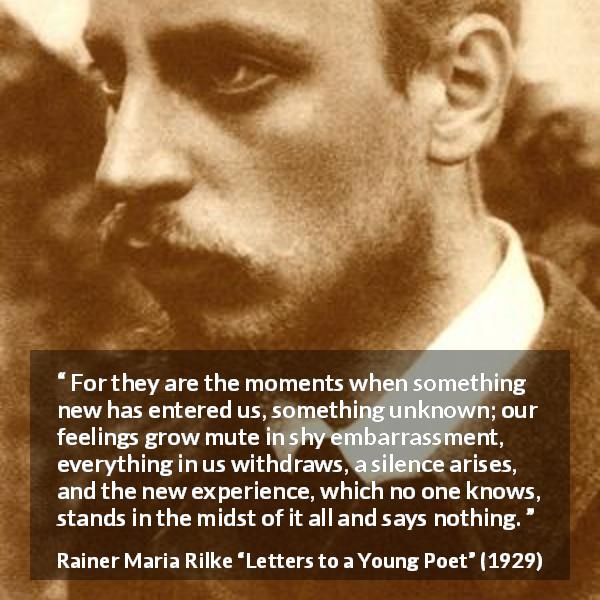

Examine the reason that bids you to write. Nobody can advise you and help you, nobody. Of ourselves, of the world, of each other. There is no greater question in my mind than how do we see more. Read more in The Importance of Walking About, Do Mirrors Tell Us Who We Are?, and Can Knowledge Be Gained Through Feelings?. On The Examined Life, I’ve approached these notions of self and self-discovery from a few different angles. Among other wonderfully rich advice, Rilke reckons solitude enables becoming-"love your solitude" he advises, and "seek answers within": Echoing the wisdom of many, including physicist Alan Lightman and the delightful Durga Chew-Bose, Rilke's advice isn't simply about solitude or silence, it's about solitude as a path to self-knowledge.

There is nothing less apt to touch a work of art than critical words.īut through generous self-expression and patient writing, Rilke proffers wisdom and reflection. I cannot go into the nature of your verses, for any critical intention is too remote from me. Let me thank you for the great and endearing trust it shows.

Your letter only reached me a few days ago. Rilke denied critical review, saying he was unfit to offer critique. In the early 20th century, Kappus asked Rilke to read and review his work. Rilke's words are nurturing and inspiring to any vulnerable creative or young mind eager to shine. (Nov.In equal turns uplifting and bracing, Letters to a Young Poet is a collection of correspondence from poet Rainer Maria Rilke (Decem– December 29, 1926) to an aspiring poet aged 19, Franz Xaver Kappus. Rilke fanatics will find some value in seeing Kappus’s side of the conversation, but the power of the book still lies in Rilke’s letters. For example, following Rilke’s third letter, on the value of solitude and the importance of attaining it, Kappus asks if “we are supposed to endure our solitude in love too” and “share with the other person only the one common element of each having this solitude.” Too often, however, Kappus’s replies are simply fawning, as when he praises Rilke’s words as possessing the “simple grandeur of the Gospels and the richness of fairy-tale kings.” Searls’s translation lacks the poetic tone of earlier editions, and the book’s structure is disappointing, placing all of Kappus’s letters together after Rilke’s, rather than arranging them chronologically. Some of them provide enriching context for Letters’ famous passages. In 2019, Rilke scholar Erich Unglaub discovered the letters that Franz Xaver Kappus, then an Austrian military cadet and aspiring poet, sent to Rilke between 19.

Rilke’s Letters to a Young Poet (1929) is given an expanded treatment including, for the first time, the letters from Rilke’s correspondent, with intermittently intriguing but underwhelming results.


 0 kommentar(er)
0 kommentar(er)
